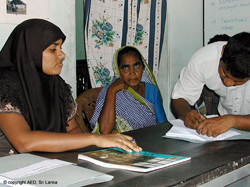You are here » Home » Telling Our Story
Success Story
Help centers assist Sri Lanka’s poorest obtain government services
Muslims Stake a Claim to their Rights

| |
Photo: AED
|
|
A young man applies for assistance at the Kinniya help center run by the Peace Secretariat for Muslims with USAID support.
“Unlike other peace secretariats, these regional centers will assure that when the Muslims create a national platform, it’s one that is informed by dialogue with their constituents. Only then will the community find its rightful place in the political process,” said USAID partner Menik De Soysa.
|
Having endured discrimination and hardship for many years, the Muslim community of Sri Lanka is learning to speak out for itself. Its goal is to claim a position as one of the country’s political stakeholders, and the community has charted a clear path to reaching that goal.
Muslims in north and east have been caught in the crossfire of the decades-long conflict between the country’s Sinhalese Buddhists and Tamil Hindus. Sri Lankan Muslims, historically known as Moors, make up only 7 percent of the island’s population.
With help from USAID, the Peace Secretariat for Muslims is working to ensure that Sri Lanka’s Muslims gain a political voice and protect their rights. As a start, the secretariat has opened regional centers where Muslims can learn about their rights and apply for government assistance. In the wake of the 2004 tsunami, these help centers have become a lifeline for many affected families.
In Kinniya, near the eastern port city of Trincomalee, Muslims displaced by the conflict and living in camps on government land were hit especially hard by the tsunami. Through the secretariat’s local help center, USAID negotiated issuance of land deeds for the most needy families, rendering 1,200 families landowners through a single consultation with local officials. USAID helped others receive compensation for the death of family members and assisted women who were home-bound by the traditional Muslim 40-day mourning period in accessing government services.
In the short run, the help centers are teaching Muslims how to tap into government assistance. More importantly for the long term, they are teaching Muslims about their rights and about opportunities for contributing to the country’s political landscape. The help centers have a deep connection to grassroots Muslim sentiment, which is rare in a country where political organizations tend to be highly centralized. USAID is now helping transform the help centers into district-level secretariat offices that will engage Muslim constituents in the peace process and open the door for coordination with local representatives of counterpart organizations. New offices will open in regions where significant numbers of Muslims reside.
Print-friendly version of this page (489kb - PDF)
Click here for high-res photo
Back to Top ^ | 

